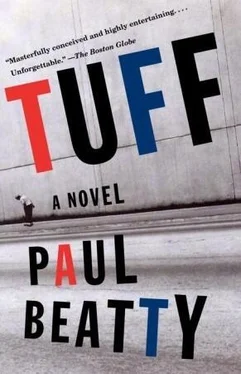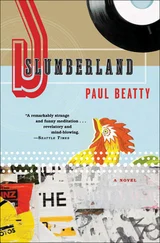“We going to be broke this summer.”
“Dead and stinking.”
“ ‘Gitchi gitchi ya ya da da.’ ”
Shaking his head, Fariq bemoaned the shortsightedness of his friends. “That’s why niggers don’t have shit. You know, the average white man holds on to a dollar for one-point-six-five years. Guess how long stupid niggers like yourselves hold on to a dollar?”
“How long, motherfucker?”
“Thirty-eight minutes.” Fariq wearily leaned back against the sloping stairs. He lifted his head and said, “My people … my people,” hoping someone would see fit to put him out of his misery. From the bottom of the stoop, Charles O’Koren, who’d remained silent until this point, willingly delivered the death blow. “TLC Beatrice ain’t even a black-owned entity .” He waited for the gasps of disbelief to subside, then continued: “I seen a special last week — the brother who owned it been dead for years. Money was worth a couple hundred mil at least. Hear me, ‘Money was worth’—ha, ha. I got jokes, right?”
Charles “Whitey” O’Koren was an American anachronism, the last of a dying breed: the native, destitute, inner-city white ethnic. The O’Korens moved to East Harlem in the mid-twenties when it was still a haven for scab labor. The slack-shouldered Whitey lived on 111th and Third Avenue with his mother, Trish; stepfather, Felix Montoya; and Grandpa Mickey. During the postwar forties Mickey O’Koren had watched tidal waves of REO Speedwagon trucks crash upon the streets, then recede into night, leaving wiggly hordes of indistinguishable young Puerto Ricans skittering and writhing on the streets like exposed grunion. “Better than more wops,” he’d say optimistically, waving goodbye to the Giamattis, the Lambresis as they closed the doors to the Packard and headed for the lily-white sanctuary of the South Bronx. Soon the package stores were called bodegas and the food stocks on the local shelves were unpronounceable. Cables of cured brown longaniza puerpoiquena replaced the red links of kielbasa and bangers. In the clash of cultures pidgin arguments with Spanish tenderos in blood-splattered lab coats were commonplace. “Listen, jocko, I want yellow bananas, not these unripe, snot-green plátanos. Who do you think you’re calling ‘Mofungo’? And give me a pound of papas , Chico.”
The headstrong patriarch ignored pleas from friends and family to move. So long as there was a local barbershop that cut “non-burrhead” hair and Guinness came in the can, Mickey saw no need to relocate. When his grandson was born, Mickey wrapped him in a green, white, and orange blanket and lobbied for a Gaelic name — Eamonn, Colin, or Paddy. Trish, wanting something less Hibernian, plied Grandpa Mickey with creamy stout and stated her case for a soft euonym, español perhaps, a name that sang racial armistice, so the boy wouldn’t feel so different from the other kids — Miangel, Panchito, or Ramón, she suggested. After three weeks of debate they settled on the classically safe Charles Michael O’Koren. It was the neighbors who revived the old Anglo-American sobriquet and dubbed the boy Whitey.
Whenever a stranger asked Charles whether he found the ethnic blatancy of his nickname a hindrance, the hard-hearted, freckled boy of nineteen replied, “It makes me no nevermind.” In private he preferred to be called C–Ice or Charley O’. But there were paranoid tendencies lurking underneath his b-boy scowl. Often while walking the streets of Spanish Harlem minding his business, Charles flinched upon hearing a frustrated local curse the living gods with a “Fuck whitey!” forcing him to ask what he’d done wrong. Charles implored his friends not to call him Whitey, and they begrudgingly agreed. However, old-timers such as Winston, Fariq, and Armello sometimes slipped and called him that, out of equal parts habit and condescension.
“For real,” Winston asked Charles, “a black man don’t even own the business?”
“Word. A nigger used to own it, but like I said, the nigger dead, now his wife running the company.”
Winston could almost see the word “nigger” come out of Charles’s mouth. Normally Winston chastised him with a punch to the chest for using “nigger” in his presence, but he didn’t know this dead executive, and he let the trespass slide. “His wife ain’t black?”
“No, Tuff, the bitch is Filipino or some shit.”
“Filipina,” said Yolanda, angrily snatching the magazine from Fariq’s hands. She scrutinized the chart as if she were reading the bylaws of a clearinghouse sweepstakes to decide if she’d really won ten million dollars. “You mean the largest black company in America is owned by an Oriental bitch?”
“Asian.”
“Shut up, Winston. Where’s the sense in that? Just because a black man used to own the business, to act like the shit is still black! If that’s the logic, then the damn Indians still collecting rent on all this,” Yolanda spouted, sweeping the cement expanse of 109th Street with a real-estate-agent wave of her hand. “I swear to God, niggers is retarded.”
Armello didn’t like the defeatist tone Yolanda was setting and tried to put a positive spin on the proceedings. “Come on now, no need to be upset — so the largest black company is owned by a Chink, so what? We still got the number two company. What’s número dos ?”
Yolanda scanned the full-page chart; sucking her teeth in disappointment, she tossed the magazine back in Fariq’s lap. “Norman Kearny’s Automotive Group. A goddamn car dealership in Detroit is the largest truly black-owned business. This is sad; I feel like crying. A fucking used-car salesman! The next business down is probably them African niggers selling fake Rolex watches at the Statue of Liberty.”
Fariq looked crestfallen. Nadine slung a sympathetic arm around Fariq and glared at Yolanda. “Well, bitch, at least my man trying. Ever since they almost got shot everybody been like ‘Life too short. I got to get paid, now.’ What ideas your man got?”
All heads swiveled toward Winston, who had tuned out soon after the “Asian” “Shut up, Winston” exchange and was now busy filling out a wrinkled pink form with the short green lottery pencil, using Charles’s back for a hard surface.
“Tuffy, what the fuck you doing?”
“Filling out my unemployment sheet. It’s obvious dealing with you estúpidos , I’m going to need the two months I got left. Anyway, I got my own program in the works. I don’t need y’all. I’m just out here for the camaraderie and the excitement. Let’s see, ‘Date of Search’—last Tuesday.”
Armello snorted, “ Coño , why you got be so negative, Tuff? The city going catch you in a lie — last Tuesday you was sleep all day because we broke night Monday.”
Winston licked the point of his pencil and scribbled on. “ ‘Name and/or Title of Person Contacted’—Lester Muñoz’s — no, wait, Maldonado’s Auto Body, 5881 West 147th Street, Harlem, New York.”
Charles started to straighten up. “The numbers on Forty-seventh only go up to five hundred something.”
Winston cuffed Whitey sharply on the back of head. “Stop moving, nigger.” Charles placed his elbows back on his knees. “ ‘Contact Method’—C-lo game in back room. ‘Work Sought’—speedometer adjuster, stolen parts inventory taker.”
“You playing yourself, Winston.”
“ Resultado —offered position, but unable to accept position because I’m too fat for the available jumpsuits, also allergic to carbon monoxide/dioxide, whatever.” Winston folded up the sheet and slipped it into his back pocket. Yolanda scooted away from the banister, putting a bit of distance between her and her lazy man. “Winston, why you acting like this?” she whined.
Читать дальше












